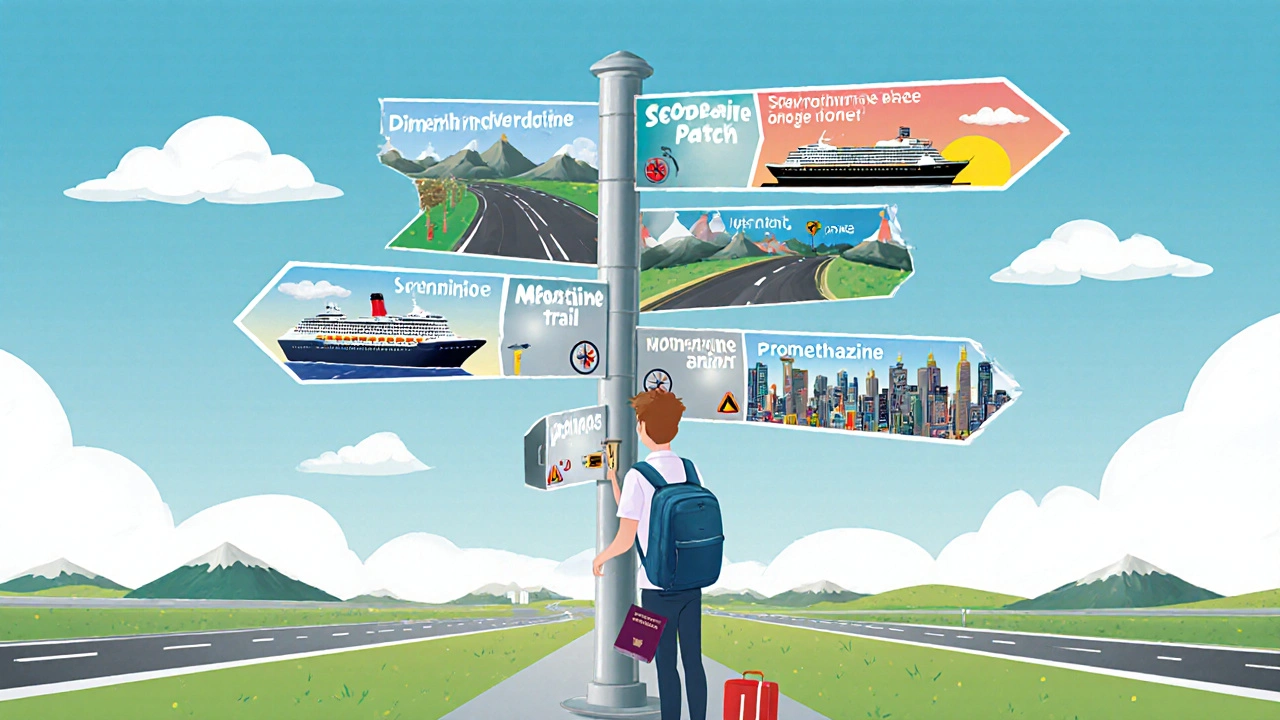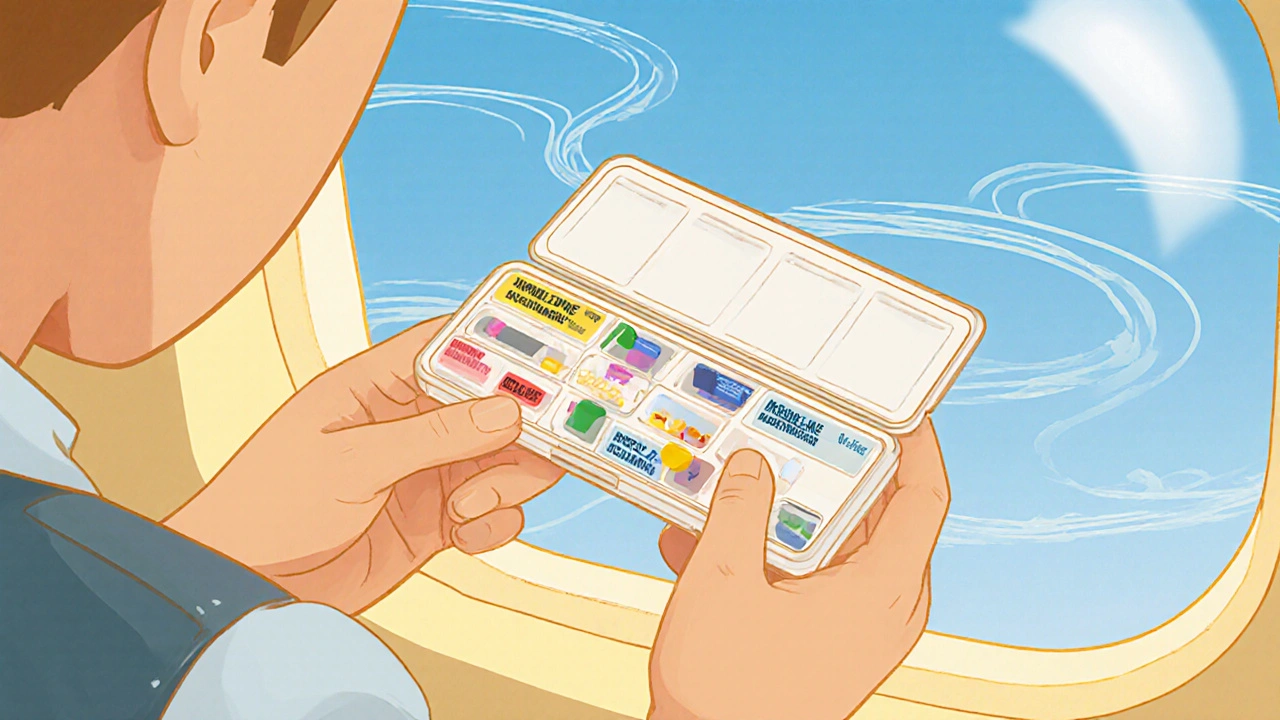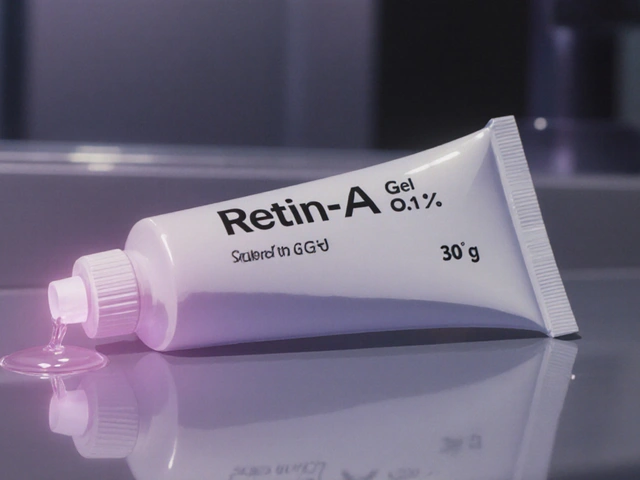Motion Sickness Medication Selector
Find Your Best Motion Sickness Medication
Answer a few questions about your travel needs and health conditions to get a personalized recommendation for motion sickness medication.
Key Takeaways
- Meclizine (Antivert) works well for short‑term vertigo and motion sickness, with a low sedation profile.
- Dimenhydrinate and diphenhydramine are cheaper but often cause more drowsiness.
- Scopolamine patches provide long‑lasting relief for travel but have anticholinergic side‑effects.
- Promethazine is strong for severe nausea but should be avoided in patients with respiratory issues.
- Choosing the right drug depends on onset speed, duration, side‑effect tolerance, and any existing health conditions.
What is Meclizine (Antivert)?
Meclizine is an antihistamine marketed in the UK under the brand name Antivert. It blocks histamine H1 receptors in the inner ear and brain, reducing the vestibular stimulation that causes dizziness and nausea. Typical adult dosage for motion‑sickness prevention is 25‑50mg taken one hour before travel; for vertigo, a single 25mg dose may be repeated after 24hours if needed. The drug’s onset is about 30‑60minutes, and effects can last up to 24hours. Common side‑effects include mild dry mouth and occasional drowsiness, but it is generally less sedating than first‑generation antihistamines such as diphenhydramine.
Because Meclizine is metabolised by the liver (CYP2D6) and excreted unchanged in the urine, it is considered safe for most healthy adults. However, caution is advised for patients with glaucoma, urinary retention, or severe liver disease.
Common Alternatives to Meclizine
Below are the most frequently used over‑the‑counter or prescription options for motion‑induced nausea and vertigo. Each entry includes a brief definition, typical dosing, and a note on its main pros and cons.
Dimenhydrinate (brand name Dramamine) is a combination of diphenhydramine and 8‑chlorotheophylline. It works by suppressing the vestibular system and the vomiting centre. The usual adult dose is 50‑100mg every 4‑6hours, with a maximum of 400mg per day. It takes effect within 15‑30minutes and lasts 4‑6hours. The biggest drawback is its higher sedation rate, which can impair driving or operating machinery.
Scopolamine is an anticholinergic delivered via a transdermal patch (often brand name Transderm‑Scop). A single patch releases 1mg over 72hours, providing steady protection for long trips. Onset is about 6‑8hours after application. Its anticholinergic side‑effects-dry mouth, blurred vision, and potential confusion-make it unsuitable for older adults or patients with Parkinson’s disease.
Promethazine belongs to the phenothiazine class and is prescribed for severe nausea, motion sickness, and allergic reactions. The standard adult dose for motion sickness is 12.5‑25mg, taken 1hour before travel and repeated every 4‑6hours if needed. While highly effective, it can cause marked drowsiness, respiratory depression in children, and extrapyramidal symptoms with long‑term use.
Benztropine is an anticholinergic agent primarily used for Parkinson’s disease but occasionally prescribed off‑label for vertigo. Typical doses range from 0.5‑2mg per day. Its strong anticholinergic profile leads to dry mouth, constipation, and possible cognitive slowing, limiting its use to patients who can tolerate these effects.
Cyclizine is a piperazine‑derived antihistamine similar to Meclizine but with a slightly higher sedation rate. The usual adult dose is 50mg taken 30minutes before travel, lasting up to 12hours. It is available in many European markets and is valued for its quick onset.
Diphenhydramine (brand name Benadryl) is the classic first‑generation antihistamine. Doses of 25‑50mg are taken 30minutes before travel. It reliably prevents motion sickness but often induces profound drowsiness, making it unattractive for people who need to stay alert.
Side‑by‑Side Comparison
| Drug | Typical Adult Dose | Onset | Duration | Common Side‑effects | Major Contra‑indications | Approx. UK Cost (per pack) |
|---|---|---|---|---|---|---|
| Meclizine (Antivert) | 25‑50mg PO once | 30‑60min | up to 24h | dry mouth, mild drowsiness | glaucoma, urinary retention, severe liver disease | £2‑£3 for 28 tablets |
| Dimenhydrinate (Dramamine) | 50‑100mg PO every 4‑6h (max 400mg) | 15‑30min | 4‑6h | significant drowsiness, constipation | asthma, glaucoma, severe liver disease | £1‑£2 for 12 tablets |
| Scopolamine Patch | 1mg/72h transdermal | 6‑8h | 72h (continuous) | dry mouth, blurred vision, confusion | glaucoma, urinary retention, prostatism, Parkinson’s | £15‑£20 per patch |
| Promethazine | 12.5‑25mg PO 1h before travel | 30‑60min | 4‑6h | drowsiness, hypotension, extrapyramidal symptoms | children <2y, severe respiratory disease, pregnancy (1st trimester) | £4‑£6 for 30 tablets |
| Benztropine | 0.5‑2mg PO daily | 45‑90min | 12‑24h | dry mouth, constipation, cognitive slowing | glaucoma, narrow‑angle, severe constipation | £5‑£8 for 30 tablets |
| Cyclizine | 50mg PO 30min before travel | 30min | 12h | mild drowsiness, dry mouth | glaucoma, severe liver impairment | £2‑£3 for 20 tablets |
| Diphenhydramine (Benadryl) | 25‑50mg PO 30min before travel | 30min | 4‑6h | strong drowsiness, anticholinergic effects | asthma, glaucoma, urinary retention | £1‑£2 for 12 tablets |
How to Choose the Right Medication
- Assess the travel scenario. For a short car ride, a fast‑acting drug like Dimenhydrinate or Diphenhydramine works well. For a week‑long cruise, a longer‑acting option such as Meclizine or a Scopolamine patch may be more convenient.
- Consider your tolerance for drowsiness. If you need to stay alert (e.g., driving, operating machinery), Meclizine, Cyclizine, or low‑dose Scopolamine are preferable. Avoid Diphenhydramine and high‑dose Dimenhydrinate.
- Check for existing health conditions. Patients with glaucoma, urinary retention, or severe liver disease should steer clear of anticholinergics (Scopolamine, Benztropine) and use Meclizine with medical supervision.
- Review current medications. Meclizine is metabolised by CYP2D6; drugs that inhibit this enzyme (e.g., fluoxetine) can raise its level. Antihistamines may add to the sedative load of benzodiazepines or opioids.
- Factor in cost and availability. Over‑the‑counter options like Dimenhydrinate are cheap but may require multiple doses. Prescription patches are pricier but eliminate the need for repeated dosing.
By matching these criteria to your personal situation, you can pick a drug that balances effectiveness with safety.

Potential Drug Interactions & Safety Tips
- Alcohol. Combining any antihistamine or anticholinergic with alcohol amplifies drowsiness and impairs coordination.
- Other CNS depressants. Benzodiazepines, opioids, or sleep aids can create excessive sedation when mixed with Meclizine or Diphenhydramine.
- CYP450 inhibitors. Fluoxetine, paroxetine, and quinidine can reduce Meclizine clearance, increasing side‑effects.
- Pregnancy & breastfeeding. Meclizine is classified as Pregnancy Category B in the UK, but you should still discuss use with a GP. Scopolamine is Category C and generally avoided.
Always read the patient information leaflet, and consult a pharmacist or doctor if you have chronic conditions or take multiple medications.
Frequently Asked Questions
Can I take Meclizine daily for chronic vertigo?
Yes, many doctors prescribe a low daily dose (25mg) for chronic vestibular disorders. However, long‑term use should be monitored for dry mouth, blurred vision, or rare liver enzyme changes.
Is the Scopolamine patch safe for children?
Scopolamine patches are not recommended for children under 12years. The anticholinergic effects can cause severe confusion and tachycardia in young patients.
Which drug works fastest for sudden sea‑sickness?
Dimenhydrinate and Diphenhydramine both start within 15‑30minutes, making them the quickest over‑the‑counter choices for sudden onset.
Do antihistamines affect driving ability?
The more sedating antihistamines (Diphenhydramine, Dimenhydrinate) can impair reaction time. Meclizine and Cyclizine have milder effects, but it’s still wise to test your alertness before driving.
Can I combine Meclizine with a prescription anti‑nausea medication?
Combining Meclizine with other antihistamines or anticholinergics can increase side‑effects without adding benefit. If your doctor prescribes an anti‑emetic like ondansetron, it is generally safe, but always confirm.







Kelvin Van der Maelen
October 16, 2025 AT 18:10Meclizine sounds like a cheap fix, but you’re just ignoring the real problem of motion sickness. It’s a half‑hearted hero that pretends to be a miracle. You take a pill and expect the world to stop spinning. Spoiler: it won’t. The side‑effects are there for a reason, and you’ll feel the dry mouth later. Stop buying into the hype and look for a real solution.
Joy Arnaiz
October 16, 2025 AT 18:26One must consider the hidden agenda behind the widespread promotion of antihistamines. The pharmaceutical conglomerates have a vested interest in keeping the public dependent on their products. By branding Meclizine as a low‑sedation option, they subtly steer patients away from cheaper, non‑pharmacological methods. This strategy ensures continued market dominance and maximizes profit margins. It is essential to remain vigilant and question such narratives.
Christopher Eyer
October 16, 2025 AT 18:43I dont see why anyone would even bother with this table. Its a big marketing ploy. All the numbers look fancy but they dont tell you real life stuff. People will try the patch and get dry mouth and then blame the doc. Maybe just sit still instead of poppin pills. Anyway, the whole thing seems overhyped.
Mike Rosenstein
October 16, 2025 AT 18:51Thank you for sharing this thorough comparison; it provides a solid foundation for anyone navigating motion‑sickness options. First, acknowledging the diverse needs of patients is crucial-some prioritize rapid onset, while others value minimal sedation. Second, Meclizine’s modest side‑effect profile indeed makes it suitable for many adults seeking short‑term relief. Third, dimenhydrinate’s quicker onset may be advantageous for acute situations, though the drowsiness trade‑off should be weighed carefully. Fourth, the scopolamine patch offers unparalleled duration, perfect for extended travel, yet its anticholinergic burden warrants caution in older individuals. Fifth, promethazine remains a powerful tool for severe nausea, but the risk of respiratory depression, especially in sensitive populations, cannot be ignored. Sixth, benztropine’s off‑label use underscores the importance of specialist oversight due to its cognitive side‑effects. Seventh, cyclizine and diphenhydramine illustrate the spectrum of antihistamine choices, each with distinct onset and sedation characteristics. Eighth, cost considerations are non‑trivial; while Meclizine is affordable in the UK, scopolamine patches may strain budgets. Ninth, patient education about proper dosing timing-taking medication an hour before travel-optimizes efficacy across all agents. Tenth, clinicians should assess contraindications like glaucoma or urinary retention before prescribing. Eleventh, the table’s clarity aids quick decision‑making in clinical settings. Twelfth, real‑world experiences often differ from trial data, emphasizing the need for personalized trials. Thirteenth, hybrid approaches, such as combining a low‑dose antihistamine with non‑pharmacologic techniques, can enhance outcomes. Fourteenth, monitoring for side‑effects during the first dose is advisable to adjust therapy promptly. Fifteenth, ongoing research may soon introduce newer agents with improved safety profiles, so staying updated is essential. In summary, this comparison equips both providers and patients with actionable insights to tailor therapy effectively.
Jay Jonas
October 16, 2025 AT 19:00Man i think we all just end up chasing the next patch or pill like it’s some magic wand. Sometimes the best cure is just sitting still, looking out the window, and letting the boat sway. Sure, Meclizine does the job for a night, but have you ever tried chewing ginger or focusing on a fixed point? Those old school tricks still work for many. Don’t forget that every drug comes with a price tag, both in cash and side‑effects.
Alexander Rodriguez
October 16, 2025 AT 19:08Honestly the only thing you need to know is that Meclizine is a decent option if you don’t want to feel like a zombie. It’s not the strongest, but it won’t knock you out. If you’re looking for cheap and mild, go for it. Anything else is just overkill for most travellers.
Abhinav Sharma
October 16, 2025 AT 19:16Let’s keep the momentum going! 🚀 Meclizine can be a solid starting point, but pairing it with proper hydration and breathing techniques can boost its effectiveness 🌊💡. Remember, every body reacts differently, so monitor how you feel and adjust accordingly 😊. Stay curious and safe on your journeys! ✈️🌍
Nicole Powell
October 16, 2025 AT 19:33It is utterly disappointing to see such a reliance on pharmaceutical shortcuts. A truly educated individual would explore vestibular rehabilitation and lifestyle adjustments before resorting to a pill. The market thrives on our complacency, and we must rise above it.
Ananthu Selvan
October 16, 2025 AT 19:50Stop parroting the same junk